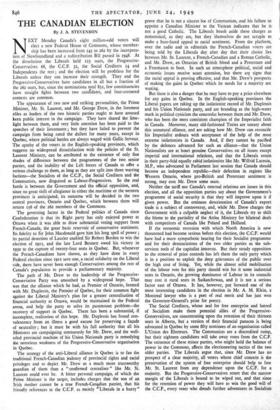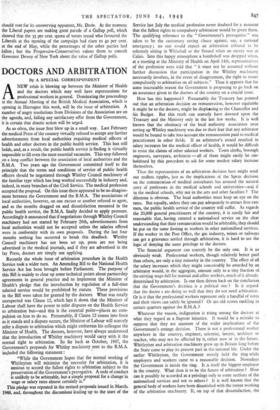THE CANADIAN ELECTION
By J. A. STEVENSON
NEXT Monday Canada's eight million-odd voters will elect a new Federal House of Commons, whose member- ship has been increased from 245 to 262 by the incorpora- tion of Newfoundland and a redistribution Bill passed in 1948. At the dissolution the Liberals held 123 seats, the Progressive- Conservatives 68, the C.C.F. 32, the Social Crediters 14 and Independents the rest ; and the election will be profitless for the Liberals unless they can increase their strength. They and the Progressive-Conservatives have candidates in all but a fraction of the 262 seats, but, since the nominations total 851, few constituencies have straight fights between two cancndates, and four-cornered contests are common.
The appearance of two new and striking personalities, the Prime Minister, Mr. St. Laurent, and Mr. George Drew, in the foremost roles as leaders of the two historic parties ought to have aroused keen public interest in the campaign. They have shared the lime- light between them, and very little attention has been paid to the speeches of their lieutenants ; but they have failed to prevent the campaign from being rated the dullest for many years, except in Quebec, where political battles are always waged with Gallic fervour. The apathy of the voters in the English-speaking provinces, which suggests no widespread dissatisfaction with the policies of the St. Laurent Ministry, can be attributed to the existence of only fine shades of difference between the programmes of the two senior parties, and the inability of the Left forces of Canada to offer a serious challenge to them, as long as they are split into three warring factions—the Socialists of the C.C.F., the Social Crediters and the Communists, now disguised as Labour-Progressives. So the real battle is between the Government and the official opposition, and, since no great shift of allegiance in either the maritime or the western provinces is anticipated, its outcome will be decided in the two central provinces, Ontario and Quebec, which between them will return 156 of the 262 members of the Commons.
The governing factor in the Federal politics of Canada since Confederation is that its Right party has only enjoyed power at Ottawa when it was able to draw substantial voting support from French-Canada, the great basic reservoir of conservative sentiment. Its fidelity to Sir John Macdonald gave him his long spell of power ; its partial desertion of Laurier enabled Sir Robert Borden to win the election of 1911, and the late Lord Bennett owed his victory in 1930 to the capture of twenty-four seats in Quebec. But, whenever the French-Canadians have shown, as they have done in every Federal election since 1911 save one, a racial solidarity on the Liberal side, there have never been enough Conservatives among the rest of Canada's population to provide a parliamentary majority.
The path of Mr. Drew to the leadership of the Progressive- Consepiative Party was smoothed by a widespread hope. That was that the alliance which he had, as Premier of Ontario, formed with Mr. Duplessis, the Premier of Quebec, for their common fight against the Liberal Ministry's plan for a greater centralisation of financial authority at Ottawa, would be maintained in the Federal arena, and help the party to solve its paramount problem—the recovery of support in Quebec. There has been a substantial, if incomplete, realisation of this hope. Mr. Duplessis has found con- valescence from an illness a good excuse for preserving a façade of neutrality ; but it must be with his full authority that all his Ministers are campaigning strenuously for Mr. Drew, and the well- oiled provincial machine of his Union Nationale party is remedying the notorious weakness of the Progressive-Conservative organisation in Quebec.
The strategy of the anti-Liberal alliance in Quebec is to fan the traditional French-Canadian jealousy of provincial rights and racial privileges and to depict Mr. Drew as a much more trustworthy guardian of them than a " confirmed centraliser " like Mr. St. Laurent could ever be. A bitter personal campaign, of which the Prime Minister is the target, includes charges that the son of an Irish mother cannot be a true French-C,an4dian patriot, that his friendly references to the C.C.F. as merely Liberals in a hurry " prove that he is not a sincere foe of Communism, and his failure to appoint a Canadian Minister to the Vatican indicates that he is not a good Catholic. The Liberals brush aside these charges as nonsensical, as they are, but they themselves do not scruple to make a bare-faced appeal to racial sentiment. From the platform, over the radio and in editorials the French-Canadian voters are being told by the Liberals day after day that their choice lies between Mr. St. Laurent, a French-Canadian and a Roman Catholic, and Mr. Drew, an Ontarian of British blood and a Protestant and a Freemason to boot. In such an atmosphere political, social and economic issues receive scant attention, but there arg signs that the racial appeal is proving effective, and that Mr. Drew's prospects of making the gains in Quebec which he needs for a majority are waning.
But there is also a danger that he may have to pay a price elsewhere for any gains in Quebec. In the English-speaking provinces the Liberal papers are raking up the isolationist record of Mr. Duplessis and his Union Nationale party, and are branding as the high-water mark in political cynicism the concordat between them and Mr. Drew, who has been the most consistent champion of the Imperialist faith in Canada. Moreover, many old-fashioned Tories are uneasy about this unnatural alliance, and are asking how Mr. Drew can reconcile his Imperialist ardours with acceptance of the help of the most extreme isolationists in Canada. And, if they cannot be pacified by the defences advanced for such an alliance—that the Union Nationalists are at heart genuine Conservatives on all issues except imperial and international relations, and that the Liberals retain in their party-fold equally rabid isolationists like Mr. Wilfrid Lacroix, M.P., who advocated in Parliament last session that Canada should become an independent republic—their defection in regions like Western Ontario, where pro-British and Protestant sentiment is strong, may cost Mr. Drew some seats.
Neither the tariff nor Canada's external relations are issues in this election, and all the opposition parties say about the Government's programme of social security is that they will improve upon it if given power. But the ominous deterioration of Canada's export trade is a subject of controversy, and, while Mr. Drew charges the Government with a culpable neglect of it, the Liberals try to shift the blame to the partiality of the Attlee Ministry for bilateral deals with competitors of Canada like Poland and Holland.
If the economic recession with which North America is now threatened had become serious before this election, the C.C.F. would have had a more sympathetic hearing for their Socialist programme and for their denunciations of the two older parties as the sub- servient tools of the capitalist interests. But their steady opposition to the removal of price controls has left them the only party which is in a position to exploit the deep grievances of the public over the high cost of living. Yet, while the almost solid mobilisation of the labour vote for this party should win for it some industrial seats in Ontario, the growing dominance of Labour in its councils may cost it rural seats in Saskatchewan, and it is not a serious factor east of Ottawa. It has, however, put forward one of the most interesting candidates in the election in Mr. A. M. Klein, a Montreal lawyer who is a poet of real merit and has just won the Governor-General's prize for poetry.
The Social Crediters, whose zeal for free enterprise and hatred of Socialism make them potential allies of the Progressive- Conservatives, are concentrating upon the retention of their thirteen seats in Alberta, but a version of their financial panacea is being advocated in Quebec by some fifty nominees of an organisation called L'Union des Electeurs. The Communists are a discredited rump, but their eighteen candidates will take away votes from the C.C.F. The existence of these minor parties, who might hold the balance of power in the Commons, affects the electioneering tactics of the two older parties. The Liberals argue that, since Mr. Drew has no prospect of a clear majority, all voters whose chief concern is the preservation of the system of free enterprise should help to free Mr. St. Laurent from any dependence upon the C.C.F. for a majority. But the Progressive-Conservatives retort that the narrow margin of the Liberals is bound to be wiped out, and that since for the retention of power they will have to win the good will of the C.C.F., every voter who dreads further adventures in Socialism should vote for its unswerving opponent, Mr. Drekv. At the moment the Liberal papers are making great parade of a Gallup poll, which showed that the 33 per cent. quota of voters tested who favoured the Liberals at the opening of the campaign had risen to 4o per cent. at the end of May, while the percentages of the other parties had fallen ; but the Progressive-Conservatives exhort them to consult Governor Dewey of New York about the value of Gallup polls.



































 Previous page
Previous page